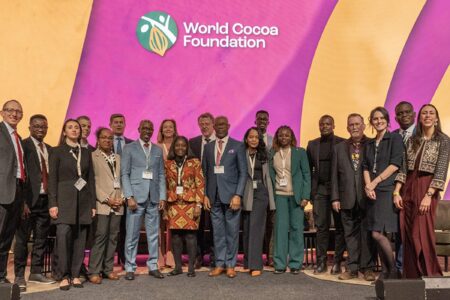Belgium’s Choprabisco set for confectionery showcase at the World Cocoa Conference

Brussels is the destination for this year's World Cocoa Conference, renowned for its chocolate sector. Pic: Neill Barston
Choprabisco, the key Royal Belgian Association of the Chocolate, Praline, Biscuit and Confectionery Industry is set to play its part among exhibitors at this year’s World Cocoa Conference, writes Neill Barston.
The organisation represents the national market – which stands as the second largest international exporter, that has gained a significant reputation for the quality of its premium brands within the country.
Confectionery Production will be on hand to cover the event live between 21-24 April, for the event organised by the International Cocoa Organisation, in collaboration with the Federal Public Service Foreign Affairs. Confectionery Production is serving as the key media partner for the conference, you can watch our preview video here, in which ICCO executive director Michel Arrion outlines his hopes for the global gathering).
As Choprabisco noted, Belgium has real gems in the chocolate sector. Innovations and creativity abound and are recognised worldwide, with noted know-how in research, production, and export of chocolate. This expertise is inextricably linked to the people who master the craft, with the organisation noting that it is essential to encourage the talent of young people in ensuring the next generation within the sector prospers.

Furthermore, as the confectionery body noted, its membership, which totals some 170 businesses, represents a major player in the nation’s economy, with a production turnover of €7.7 billion, about 10% of the total Belgian food industry. It employs 14,200 workers with 600 employers. Moreover, the sector makes a significant contribution to our Belgian exports, with €5.2 billion or 14.5% of the total food industry.
Chocolate alone has a production turnover of €6.1 billion, of which 56% or €3.4 billion is exported. Belgium is the world’s second largest exporter of chocolate after Germany, exporting 668,000 tonnes of chocolate.
Industry’s challenges
Moreover, as Choprabisco noted, the theme for this year’s conference – the first in six years owing to the pandemic, is paying more for sustainable cocoa. Indeed, the chocolate supply chain faces numerous challenges worldwide.
Over 300,000 tonnes of cocoa beans are imported into Belgium every year, more than 70% of which come from Côte d’Ivoire and Ghana. In these countries, small-scale cocoa farmers typically live in a context of poverty, creating risks of child labour and/or deforestation. Today, an average cocoa farmer in West Africa does not even earn half the living income a family needs to support themselves and invest in their cocoa farm. This is why the 2018 Berlin Declaration of the World Cocoa Conference made living income a priority. Since then, the Belgian chocolate sector has taken additional measures to better support cocoa producers in countries of origin.
Significantly, the organisation, which was among guests at our own World Confectionery Conference due to return to Brussels on 12 September, added that in 2018, then Minister of Development Cooperation, Alexander De Croo encouraged the Belgian chocolate sector to put sustainability at the heart of its focus next to top quality. The Belgian partnership, Beyond, Chocolate, was the first initiative in Europe to include a living income for cocoa farmers as an ambition in its charter.
In Beyond Chocolate, Belgian chocolate companies and chocolatiers, together with all other stakeholders involved – supermarkets, NGOs, certification organisations and universities – commit to making all chocolate produced and sold in Belgium sustainable. Beyond Chocolate aims for all chocolate produced and/or sold in Belgium to be certified or comply with a sustainable company programme by 2025. By 2030, cocoa producers linked to the Belgian market will earn a living income.

Notably, according to Beyond Chocolate’s latest annual report 2022, good progress has already been made: 90% of all chocolate sold in Belgium and 68% of all chocolate produced in Belgium is certified and/or complies with a corporate sustainability programme and 47% of all chocolate is traceable back to the cocoa farm.
Although living income was not yet on the radar of many companies’ in 2018, this challenge is now increasingly central to their sustainability strategies. For example, 15% of cocoa farmers in the value chain of Beyond Chocolate partners are supported by a living income strategy. More than 70 players in the chocolate sector have already committed to achieving a living income for cocoa farmers. There is still a long way to go in the coming years. Beyond Chocolate aims to increase demand for sustainable chocolate and guide companies in their sustainability strategy and procurement policies. To boost business, a €1.5 million fund is available for pilot projects around living income.
Choprabisco’s president Philippe de Selliers commented: “If we want to offer our customers happiness through our chocolate, we cannot afford to let cocoa farmers live in poverty. This is why Choprabisco encourages its members to pursue commitments to sustainability, this only strengthens the prestige of Belgian chocolate, which is so valued around the world. “With 14,200 employees, the Belgian chocolate, praline, biscuit, and confectionery sector is one of the most important sub-sectors of the Belgian food industry, employing 100,000 people. But we see around 800 vacancies a year at companies in the sector, who are increasingly looking for talent and skills.
Young people should be encouraged to see the many opportunities in the country’s tastiest sector, both artisanal and highly technical. Collaborations with schools, dual learning and open days, company visits and internships are the perfect springboard to our companies.
“The future of the sector lies in the hands of motivated young people who want to build their future with chocolatiers or our chocolate, biscuit and confectionery companies. We need to attract, train, and motivate them to make a difference on a global level,” concludes Choprabisco’s president.



